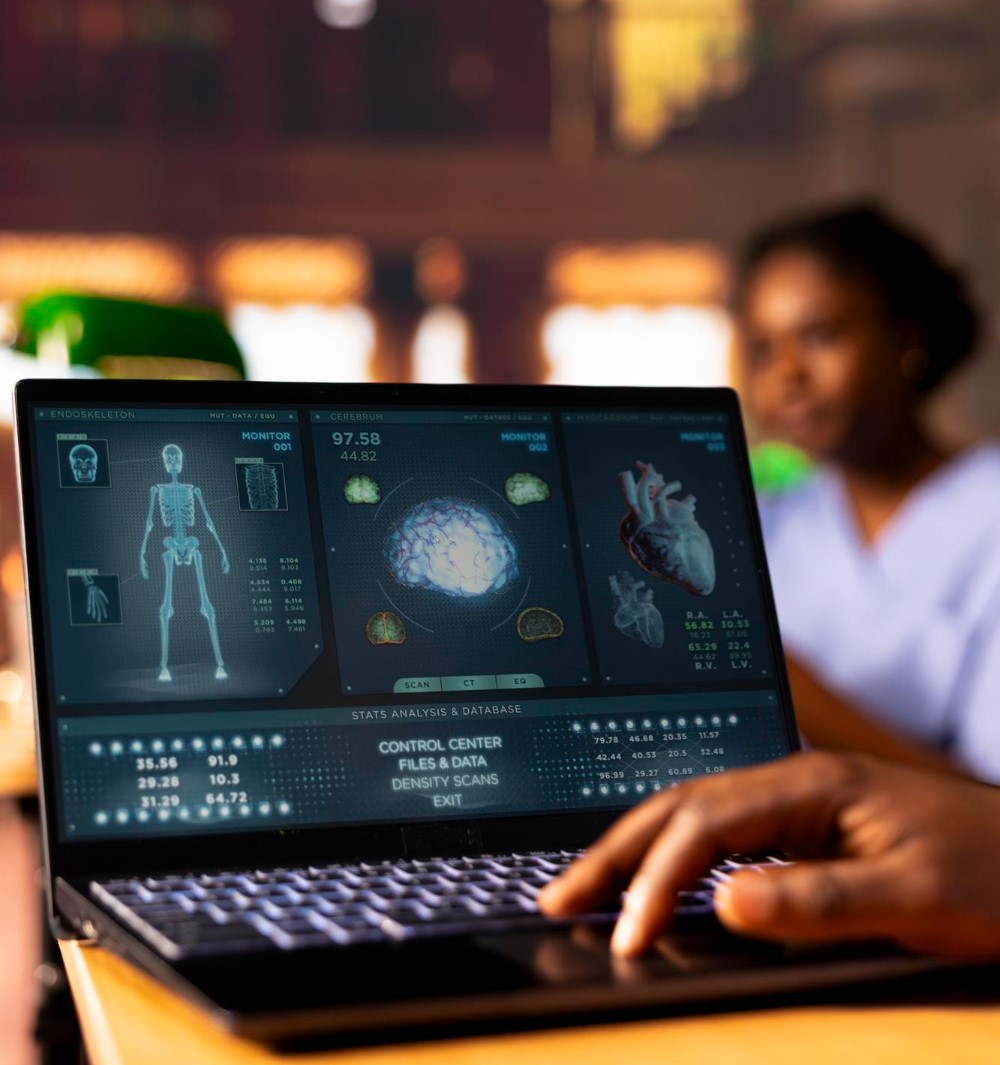
Understand how Telehealth, Smart Billing, and Digital Innovation are Transforming Healthcare Access Delivery
In the last decade, Africa’s healthcare systems have faced persistent challenges, including a severe scarcity of skilled medical professionals, lengthy distances that patients must travel to access care, and inadequate hospital infrastructure all of which hinder the delivery of quality healthcare services, and has now undergone a digital metamorphosis. From urban hospitals in Lagos and Nairobi to mobile clinics in rural Malawi, digital technology is playing an increasingly critical role in making healthcare more accessible, affordable, and efficient.
Telemedicine is breaking down the walls of distance, digital billing systems are simplifying how patients pay for care, and artificial intelligence is enabling faster and more accurate diagnoses. What was once an aspiration is now an unfolding reality.
Yet, this is only the beginning. The future of health-tech in Africa is about building integrated, patient-centric systems that connect telehealth, billing, data, mobile tools, and AI to create seamless healthcare experiences.
The following sections explore this future as a vision grounded in real trends, investment flows, policy shifts, and innovation stories across the continent.
Telehealth: The Frontline of Africa’s Digital Healthcare Transformation
Bridging the Healthcare Access Gap
For decades, African healthcare systems have struggled with a shortage of medical professionals, long patient travel distances, and limited hospital infrastructure. According to the World Health Organization, sub-Saharan Africa bears 24% of the global disease burden but has only 3% of the world’s healthcare workers.
Telehealth has emerged as a strategic equalizer. By enabling patients to consult with healthcare providers remotely, it reduces the dependence on physical infrastructure. A farmer in Kaduna no longer has to travel hours to access a cardiologist. A pregnant woman in rural Kenya can consult a midwife or doctor through a simple smartphone app.
Pandemic Acceleration
COVID-19 accelerated telehealth adoption in Africa at unprecedented levels. Lockdowns pushed hospitals to adopt remote consultation technologies, and governments fast-tracked regulatory support. Startups like Vezeeta, Healthlane, and Remedial Health grew rapidly, proving the viability of digital-first care.
Post-pandemic, patients have continued to embrace telemedicine, not just for emergencies but for ongoing chronic disease management, mental health consultations, and preventive care.
Expanding Beyond Consultations
Telehealth in Africa is evolving beyond one-on-one video calls:
Remote patient monitoring: Wearable devices that track heart rate, oxygen levels, and blood pressure are now integrated into telehealth platforms.
Chronic disease management: Patients with hypertension or diabetes can receive real-time coaching and digital medication reminders.
Integrated EHR systems: Medical records can be accessed by multiple authorized providers, improving continuity of care.
Specialized telehealth: Services like telepsychiatry, teledermatology, and tele-obstetrics are expanding access to specialist care.
According to a GSMA report, over 70% of Africans now live in areas covered by mobile broadband, providing a strong infrastructure foundation for telehealth expansion.
Medical Billing and Payment Innovation: A Game Changer
The Traditional Billing Problem
Historically, medical billing in Africa has been plagued by manual processes, lack of price transparency, and delays in insurance reimbursements. Patients often spend hours in queues to settle bills, and hospitals lose revenue due to errors, or unpaid claims.
The Digital Billing Revolution
Digital billing platforms are transforming the financial layer of healthcare. They:
Automate invoicing and claim submissions, drastically reducing human error.
Verify insurance coverage in real time, minimizing rejections.
Allow patients to make secure mobile or online payments, improving compliance.
Integrate with EHR and telehealth platforms, enabling seamless financial workflows.
Insurance Inclusion and Financial Protection
One of the biggest barriers to healthcare in Africa is out-of-pocket payments. With less than 20% insurance penetration, most patients pay for care directly. Digital billing platforms integrated with mobile money and insurance APIs are changing this.
Imagine a patient receiving a telehealth consultation, and their insurance is verified and billed automatically in real time. This is already happening in Kenya and Rwanda, where mobile money platforms like M-PESA and health insurance schemes are seamlessly connected to health providers.
This shift helps to build financial trust in the health system.
The Power of Data and AI in African Healthcare
Data as the New Healthcare Currency
Healthcare systems thrive when decisions are guided by reliable, real-time data. In Africa, telehealth platforms, EHR systems, and mHealth apps are generating massive amounts of data that were previously unavailable.
This data enables:
Early detection of disease outbreaks (e.g., malaria, cholera, COVID-19).
Better resource allocation in underserved areas.
Targeted public health interventions and policymaking.
Predictive analytics for future healthcare demand.
For instance, aggregated teleconsultation data in Nigeria helped health officials identify spikes in respiratory illnesses during harmattan seasons, enabling faster response.
AI-Powered Diagnostics
AI is now active in African hospitals today, it’s no longer futuristic
AI radiology tools are helping detect tuberculosis from X-rays in Kenya and South Africa.
Machine learning algorithms predict maternal complications in Ghanaian clinics.
Chatbots offer triage support in Uganda and Rwanda.
These solutions are particularly powerful in rural areas where specialist doctors are scarce. With AI, a nurse in a community health post can upload a patient’s chest X-ray and receive instant diagnostic support.
Data Security and Ethics
But with data comes responsibility. Patient trust is essential to the success of digital health. Countries like Nigeria and Kenya have implemented Data Protection Acts, and more are aligning with international frameworks like GDPR.
Health-tech providers are expected to use end-to-end encryption, consent management systems, and ethical AI frameworks to protect sensitive health information.
Mobile Health (mHealth): Healthcare in Every Pocket
Mobile First Healthcare
Africa is home to over 600 million mobile users, making it a mobile-first health-tech environment.
mHealth is already improving:
Maternal and child health outcomes, through SMS appointment reminders and educational messages.
Medication adherence, using push notifications and mobile reminders.
Patient engagement, allowing people to interact with their doctors anytime, anywhere.
For example, Hello Doctor in South Africa provides health education content and teleconsultations through mobile platforms, reaching over a million users.
SMS-Based Interventions
Internet penetration is still uneven across the continent. SMS-based interventions remain crucial for last-mile healthcare.
mTrac in Uganda is helping track maternal health outcomes in remote villages.
RapidSMS in Rwanda allows health workers to register pregnancies and send alerts in emergencies.
U-Report by UNICEF gives youth access to health information via free text messages.
These solutions may be simple, but they have proven highly impactful in rural health delivery.
Empowering Patients
mHealth is most importantly about patient empowerment. By enabling patients to monitor their own health, store medical history, and access medical support remotely, mHealth is shifting the power dynamics of healthcare from institutions to individuals.
The Role of Governments and Policy in Health-Tech Growth
Policy as a Catalyst
Without the right policy frameworks, even the best innovations can stall. Governments are starting to prioritize digital health strategies as part of their national health plans.
Examples include:
Rwanda’s National eHealth Strategy, which integrates telemedicine into public hospitals.
Kenya’s Digital Health Bill, which sets standards for data exchange and teleconsultation.
Nigeria’s NHIA Act, which lays the groundwork for wider insurance coverage through digital platforms.
These frameworks attract foreign investment, improve interoperability, and ensure equitable access.
Regulation for Trust and Safety
Regulation ensures that telehealth providers meet clinical standards, that AI tools are ethically used, and that patients’ rights are protected.
When people trust digital platforms, they use them more. And when they use them more, the entire healthcare ecosystem becomes stronger.
Cross-Border Collaboration
Africa’s health challenges don’t respect borders, and neither should its digital health solutions. The African Union and Africa CDC are driving efforts toward regional interoperability, shared disease surveillance, and standardized telemedicine protocols.
A telehealth platform in Nigeria could someday easily serve patients in Ghana or Senegal under a unified framework which would be a game-changer for continental healthcare delivery.
Innovation Beyond Borders: Africa’s Global Health-Tech Footprint
African Startups Going Global
Africa is importing technology and currently exporting innovation.
mPharma (Ghana) is improving medicine supply chains in multiple African countries.
54gene (Nigeria) is advancing genomics research globally.
Zipline (Rwanda) is leading the world in drone-based medical deliveries.
These are proof points of a larger wave of homegrown digital health leadership.
Partnerships with Global Players
Collaborations with global tech giants are accelerating this growth. Google Health, AWS, and Microsoft AI for Health are partnering with African startups to scale telehealth and AI solutions, while international donors are funding infrastructure expansion.
Building Africa’s Digital Health Exports
African startups are well positioned to sell their software and platforms globally—especially to other emerging markets that face similar challenges.
This creates not just health outcomes, but economic growth opportunities—a rare and powerful combination.
Challenges Facing Health-Tech Growth in Africa
Despite the momentum, health-tech faces structural hurdles that must be overcome for sustainable growth:
Infrastructure gaps: Unreliable power supply and limited internet coverage in rural areas.
Digital literacy: Both patients and some healthcare workers need training to use new systems effectively.
Regulatory inconsistency: Different countries have different rules, making cross-border scaling difficult.
Funding constraints: Many startups lack long-term investment, slowing expansion.
Trust and adoption: Some communities are still skeptical of digital health solutions.
The future of health-tech depends on how governments, private innovators, and investors tackle these challenges collaboratively.
The Future: What’s Next for African Health-Tech?
AI-Driven Personalized Care
A future where AI predicts a diabetic crisis before it happens, where wearable devices alert doctors in real time, and where treatment plans are tailored to each patient’s biology is a future isn’t far off. With improved data collection and cloud computing, personalized care can be mainstreamed in African healthcare.
Virtual Hospitals and Digital-First Clinics
Virtual hospitals will allow patients to access multiple departments remotely; radiology, labs, pharmacy without leaving their homes. Startups in Egypt and Nigeria are already piloting fully digital-first clinics, reducing overhead costs and increasing access.
Blockchain for Health Records
Blockchain technology could create secure, tamper-proof patient records, making interoperability across facilities and borders seamless. Patients would control their data, granting access when needed a critical advancement for cross-border care.
Global Investment Surge
Africa’s health-tech sector is attracting unprecedented investment. In 2024 alone, over $800 million was invested in African digital health startups. With the right regulatory frameworks and infrastructure, this number could multiply in the coming decade, fueling innovation.
How Delon Health is Driving Africa’s Health-Tech Revolution
Delon Health is playing a central role in powering this transformation.
Telehealth Solutions: Secure, user-friendly virtual consultation platforms bridging the gap between patients and providers.
Smart Billing Systems: End-to-end automated billing and insurance integration that reduce claim rejections and speed up payments.
Patient Empowerment: Tools that give patients ownership of their health records and access to care from anywhere.
Regulatory Compliance: Delon Health adheres to strict data protection standards, ensuring patient trust and legal compliance.
By merging technology, trust, and strategy, Delon Health is helping healthcare organizations modernize their operations and deliver better outcomes.
Conclusion: A Healthier, Digitally Connected Future
The future of health-tech in Africa is unfolding now rather than a distant vision
Telehealth is making expert care accessible in the remotest corners of the continent. Smart billing solutions are bringing financial transparency and insurance inclusion. AI, mobile health, and blockchain are laying the foundation for a more connected, efficient, and patient-centred healthcare ecosystem.
The challenge ahead is to scale these innovations equitably and sustainably. With strong policies, strategic investment, and a shared commitment to patient well-being, Africa can become a global leader in digital health innovation.
And Delon Health is proud to help build that future. Whether it’s telehealth consultations, automated billing, or integrated care solutions, we are committed to empowering healthcare providers and improving patient experiences across the continent.
Visit delonhealth.com to explore how we can help your organization lead in the digital health revolution.









